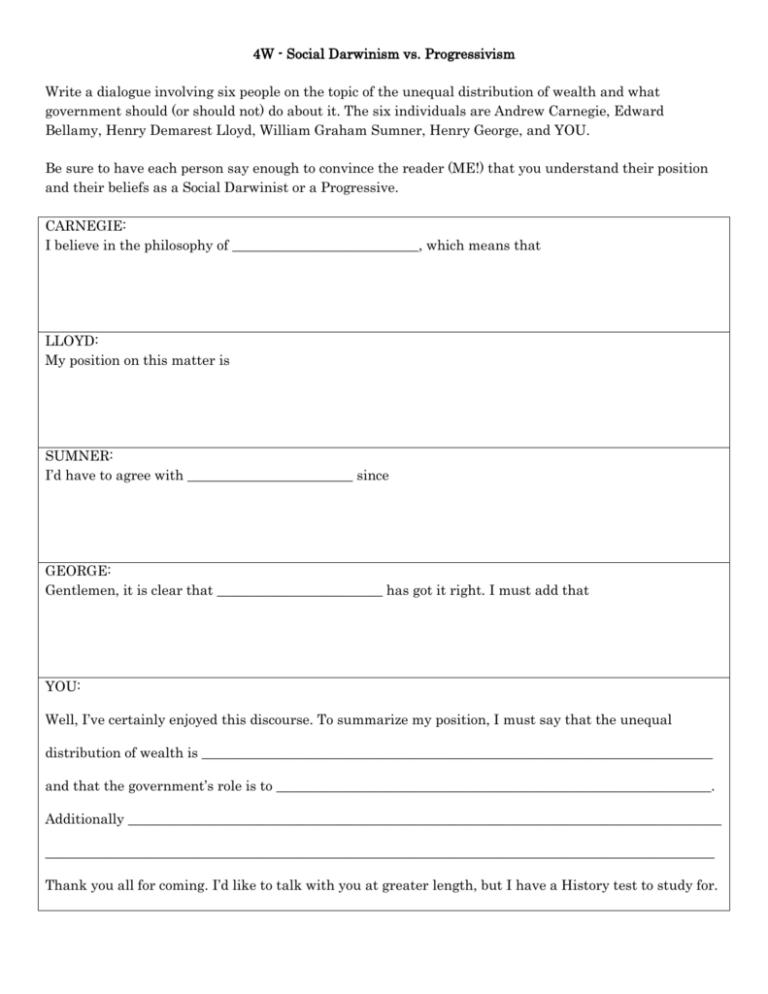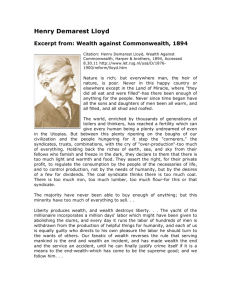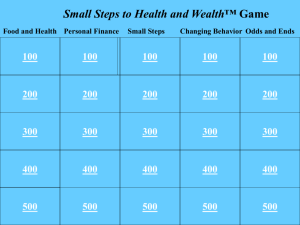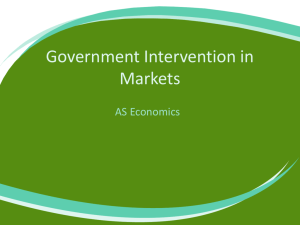Henry George Excerpt from: Progress and Poverty, 1879
advertisement

4W - Social Darwinism vs. Progressivism Write a dialogue involving six people on the topic of the unequal distribution of wealth and what government should (or should not) do about it. The six individuals are Andrew Carnegie, Edward Bellamy, Henry Demarest Lloyd, William Graham Sumner, Henry George, and YOU. Be sure to have each person say enough to convince the reader (ME!) that you understand their position and their beliefs as a Social Darwinist or a Progressive. CARNEGIE: I believe in the philosophy of ___________________________, which means that LLOYD: My position on this matter is SUMNER: I’d have to agree with ________________________ since GEORGE: Gentlemen, it is clear that ________________________ has got it right. I must add that YOU: Well, I’ve certainly enjoyed this discourse. To summarize my position, I must say that the unequal distribution of wealth is __________________________________________________________________________ and that the government’s role is to _______________________________________________________________. Additionally ______________________________________________________________________________________ _________________________________________________________________________________________________ Thank you all for coming. I’d like to talk with you at greater length, but I have a History test to study for. Andrew Carnegie Wealth, June 1889 Citation: Wealth, by Andrew Carnegie, North American Review Vol.148, Issue 391 pp.653-665, June 1889. (Later published as Part I of The Gospel of Wealth) The Socialist or Anarchist who seeks to overturn present conditions is to be regarded as attacking the foundation upon which civilization itself rests, for civilization took its start from the day when the capable, industrious workman said to his incompetent and lazy fellow, "If thou dost not sow, thou shalt not reap," and thus ended primitive Communism by separating the drones from the bees. Not evil, but good, has come to the race from the accumulation of wealth by those who have had the ability and energy to produce it. There remains, then, only one mode of using great fortunes. [It should be] administered for the common good; and this wealth, passing through the hands of the few, can be made a much more potent force for the elevation of our race than if it had been distributed in small sums to the people themselves. Henry Demarest Lloyd Excerpt from: Wealth against Commonwealth, 1894 Citation: Henry Demarest Lloyd, Wealth Against Commonwealth, Harper & brothers, 1894, Holding back the riches of earth, sea, and sky from their fellows who famish and freeze in the dark, they [corporations] declare to them that there is too much light and warmth and food. They assert the right, for their private profit, to regulate the consumption by the people of the necessaries of life, and to control production, not by the needs of humanity, but by the desires of a few for dividends. The coal syndicate thinks there is too much coal. There is too much iron, too much lumber, too much flour-for this or that syndicate. The majority have never been able to buy enough of anything; but this minority have too much of everything to sell. . . Two social energies have been in conflict, and the energy of reform has so far proved the weaker. We have chartered the self-interest of the individual as the rightful sovereign of conduct; we have taught that the scramble for profit is the best method of administering the riches of earth and the exchange of services. Only those can attack this system who attack its central principle, that strength gives the strong in the market the right to destroy his neighbor. William Graham Sumner Excerpt from: "The Challenge of Facts”, ca. 1880 Citation: William Graham Sumner. The challenge of facts: and other essays, Volume 3. Yale University Press, 1914 In this struggle every individual is under the pressure of the necessities for food, clothing, shelter, fuel, and every individual brings with him more or less energy for the conflict necessary to supply his needs. The relation, therefore, between each man's needs and each man's energy, or "individualism," is the first fact of human life… Let it be understood that we cannot go outside of this alternative; liberty, inequality, survival of the fittest; not liberty, equality, survival of the unfittest. The former carries society forward and favors all its best members; the latter carries society downwards and favors all its worst members. . . What we mean by liberty is civil liberty and this means the guarantees of law that a man shall not be interfered with while using his own powers for his own welfare. Liberty, therefore, does not by any means do away with the struggle for existence. Henry George Excerpt from: Progress and Poverty, 1879 Citation: George, Henry, Excerpt from Progress and Poverty. 1912. Library of Economics and Liberty. Accessed August 30, 2011. http://www.let.rug.nl/usa/ So long as all the increased wealth which modern progress brings goes but to build up great fortunes, to increase luxury and make sharper the contrast between the House of Have and the House of Want, progress is not real and cannot be permanent. The equal right of all men to the use of land is as clear as their right to breathe the air-it is a right proclaimed by the fact of their existence. For we cannot suppose that some men have a right to be in this world and others no right. . . Our civilization has reached a critical period, and that unless a new start is made in the direction of social equality, the nineteenth century may to the future march its climax. What change may come, no mortal man can tell, but that some great change must come, thoughtful men begin to feel.








